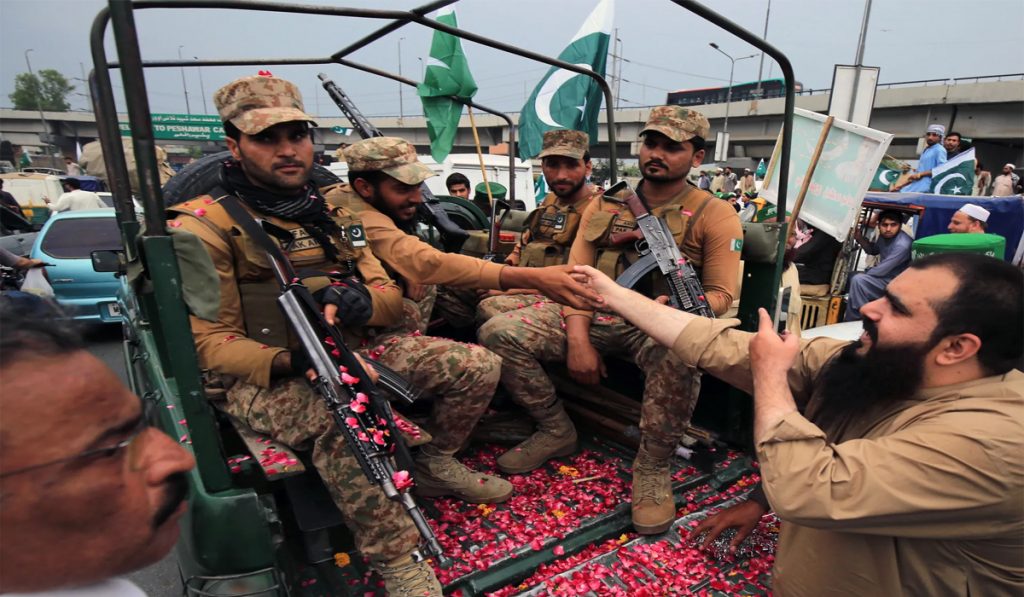Pakistan constantly ranks among militarily powerful countries, but military intelligence (ISI) has been accused of fomenting unrest and instability in the region. Just last year, the ISI was accused of sabotaging the 2024 general elections in Pakistan itself.
A Legacy of Control
The ISI is often described as a “state within a state,” amplifying its control through its vast network of surveillance, coercion, and covert operations. Together, they have created a system where dissent is just discouraged but actively punished.
PakistanKhwab: A War Within
Pakistan is in the grip of a severe political crisis, particularly in Khyber Pakhtunkhwa (KP), a province in the northwestern region bordering Afghanistan. This area has been the epicenter of a struggle between the military establishment, led by the ISI, and the Pakistan Tehreek-e-Insaf (PTI), the political party of jailed former Prime Minister Imran Khan. The conflict has led to violent clashes, with the military accused of cracking down on PTI supporters and the party alleging voter fraud and suppression in recent by-elections.
Media and Civil Society: The Expression
The military’s influence extends to Pakistan’s media outlets and civil society organizations, which face constant censorship, harassment, and violence. In 2024 alone, several journalists were reportedly killed, abducted, or threatened by state actors, according to the Committee to Protect Journalists (CPJ). Civil society groups, particularly those advocating for human rights, face similar threats, with many activists forced into exile.
A History of Interference
Pakistan’s military has a long history of interfering in civilian governance. Since the country’s independence in 1947, the military has staged multiple coups, ruling directly for about half of Pakistan’s history. Even during periods of civilian rule, the military has maintained significant influence through the ISI, often manipulating elections and political parties to ensure its dominance. The ISI’s role in supporting militant groups in Afghanistan and Kashmir has also drawn international criticism, with allegations of links to terrorist organizations like the Taliban and Lashkar-e-Taiba.
Political Turmoil
The current political crisis in KP centers on the PTI, which emerged as a major political force under Imran Khan’s leadership. Khan, a former cricketer turned politician, was ousted as prime minister in 2022 through a no-confidence vote, which he alleges was orchestrated by the military. Since then, Khan has been imprisoned on various charges, which his supporters claim are politically motivated. The PTI has organized mass protests, often met with violent crackdowns by security forces. In 2024, the military’s actions against the PTI have escalated, with reports of mass arrests and alleged extrajudicial killings.
Economic and Social Crisis
Pakistan is also grappling with a severe economic crisis, with inflation soaring and the Pakistani rupee plummeting. The military’s dominance has been blamed for exacerbating these issues, as its vast budget—estimated to consume a significant portion of the national budget—diverts resources from social services and development. The military’s control over key industries, such as real estate and manufacturing, has also led to accusations of corruption and cronyism.
Regional and Global Implications
The unrest in Pakistan has broader implications for the region and the world. The country’s strategic location, nuclear arsenal, and proximity to Afghanistan and India make its stability a global concern. The ISI’s alleged support for militant groups has strained relations with the United States and other Western countries, while its close ties with China—particularly through the China-Pakistan Economic Corridor (CPEC)—have raised concerns about growing Chinese influence in the region.
The Path Forward
Breaking this cycle of military dominance will require significant reforms. First, the ISI must be subordinated to civilian oversight mechanisms to ensure accountability and transparency. Second, free press are essential to combating terrorism, ensuring fair elections, and promoting international pressure on military officials linked to human rights abuses. Finally, Pakistan must push forward with reforms to strengthen its civilian institutions, though this will require overcoming deeply entrenched military interests, particularly against violence, which threatens to further destabilize the country.
Conclusion
The military’s grip on Pakistan’s politics, economy, and society is a complex and deeply rooted issue. Despite offers of hope, constraints often dominate resilience, demonstrating the military’s ability to suppress dissent and maintain its grip on power. While the Pakistani people yearn for a more democratic future, the path to reform remains fraught with challenges, requiring both internal resolve and international support to break the cycle of military dominance.
